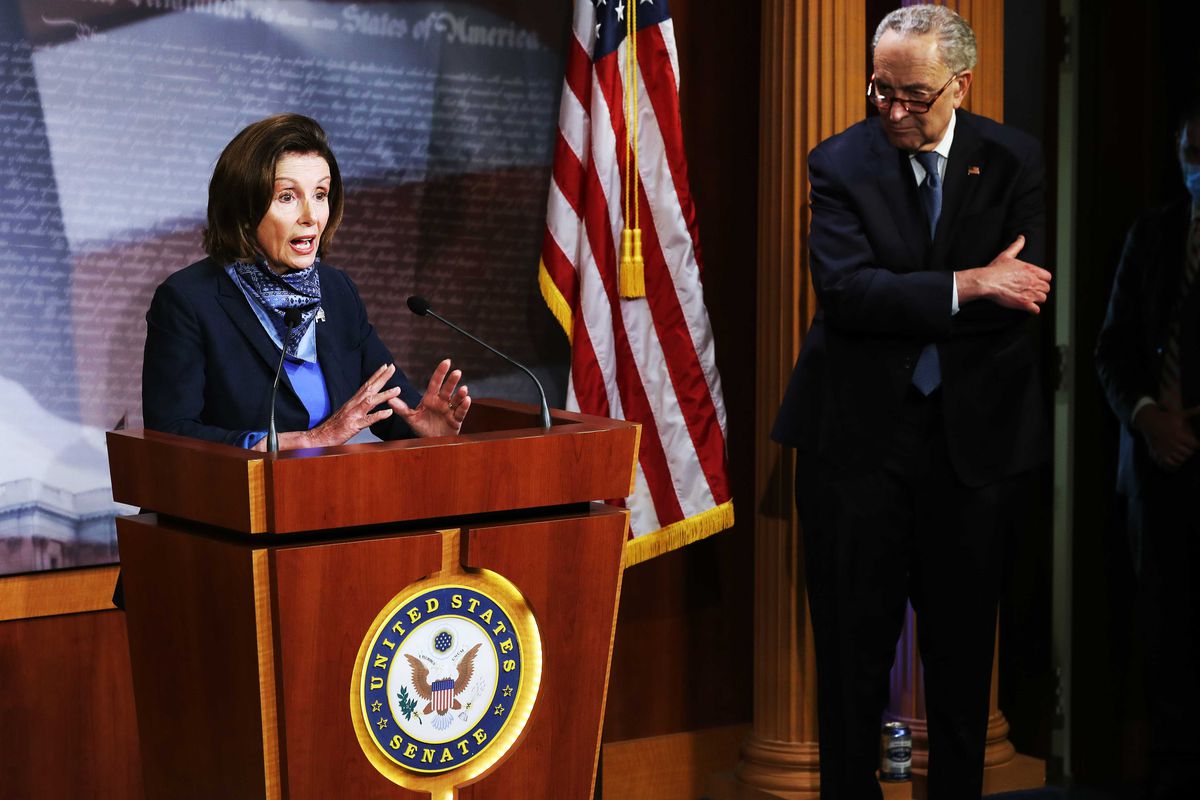The US is debating another coronavirus relief package. Why are some calling for it to be different?

A few minutes every morning is all you need.
Stay up to date on the world's Headlines and Human Stories. It's fun, it's factual, it's fluff-free.
In late March, the United States government passed a nearly US$2 trillion economic relief package aimed at buttressing the economy and providing economic relief for workers and families, including the provision of US$600 in weekly jobless benefits and a one-time US$1,200 direct payment to most Americans.
Although the Democrats in the House passed a US$3.4 trillion package in May called the HEROES Act that would have given Americans another direct payment and extended the current rate of jobless benefits until January 2021, among other provisions, it failed to gain traction in the Republican-controlled Senate.
At the time, US Senate Majority Leader Mitch McConnell characterized the bill as little more than an unrealistic wish list from Democrats. As July comes to an end, however, US lawmakers are positioning themselves to pass another aid package, albeit one that is likely to be much smaller than the one that passed the House in May.
According to reports, Republicans are proposing a US$1 trillion bill that would lower weekly unemployment benefits to US$200 per week, US$400 less than the amount currently allocated to weekly unemployment benefits and that expires at the end of this month.
While the Republican plan is set to be officially unveiled on Monday, it is far from a done deal. The Democratic Speaker of the House, Nancy Pelosi, has made it clear that Democrats are ready to negotiate to get something passed before the end of the week.
Pelosi also called on Republicans to ensure that talks commence quickly, noting that Congress “can’t go home” without an agreement.
While the two parties have markedly different outlooks regarding the size and scope of the proposed bill, there have reportedly been significant arguments within the Republican Party itself as to the makeup of the package.
Late last week, Republican lawmakers sparred with the White House over extending unemployment benefits and other provisions, eventually resulting in the Trump administration dropping its earlier stance that the bill must include a payroll tax cut.
Many Republicans cite concerns over a prolonged welfare state as a reason why benefits should be reduced. Some say the current benefits are too accommodating, putting some workers in a position to collect more than what they would make if they worked full time.
According to Democrats, however, unemployment is still historically high and the need to ensure security for American workers is paramount, especially during a time of rising coronavirus cases.
Differing economic views
For Paul Krugman, an economist and editorial writer for The New York Times who normally advocates for progressive policy stances, the underlying economic situation in the country, including the high unemployment rate and ongoing uncertainty over the virus, means that the government should do all it can to provide strong relief for American workers.
“A huge cut for unemployed workers with little chance of finding jobs, and a giant fiscal contraction — equivalent to US$600 billion at an annual rate — that will deepen the slump,” he argued on Twitter.
Krugman also noted that a proper recovery will fail to materialize until the virus is beat, meaning that any attempts to reopen the economy or follow business-as-usual protocols will only come back to haunt the US until COVID-19 is under control.
According to data published by Bloomberg, America’s failure to keep the virus under control has negative implications on the US economy overall. The European Union (EU), meanwhile, is expected to come out of the pandemic with a significantly less harsh economic contraction.
For the EU, the economy is estimated to have shrunk 12% from April to June. For the US, the annualized contraction forecast is expected to be a 35%, a roughly 10% decline from quarter to quarter. Similarly, in 2021, the EU is expected to far outpace US growth numbers.
Without extending unemployment benefits in some form, the economic situation for the US is expected to worsen as incomes and spending fall sharply.
The EU passed its own US$860 billion economic relief package earlier this month that will be distributed among its partner states.
Would a bigger stimulus be bad for the country?
For Stephen Moore, a conservative economist who co-authored the book “Trumponomics” with Arthur Laffer, a longtime proponent of the “trickle down” economic policy that was implemented during the Reagan years, a bigger stimulus package will only make the economy worse off in the long run.
In a tweet posted just before passage of the first economic relief package in March, Moore criticized one-off payments to Americans, claiming that “Keynesian stimulus [injecting money into the economy to boost aggregate spending among the populace] almost always fails, and often makes the downturn worse and the eventual recovery weaker.”
Speaking with TMS, Dr. Michael Merrill, Professor of Professional Practice and the LEARN Director for Rutgers University, says the legacy of policies advocated by Moore and Laffer are suspect.
“The worst thing you can do is anything that benefits the poor directly. According [to] the Republican orthodoxy, the poor don’t know what to do with any advantage you give them. If they knew how to manage money, they wouldn’t be poor,” he said.
He also criticized Democrats for not doing enough to even out the economic playing field in general, even if they are more willing to spend money on workers.
“The Democrats are a little more willing to give money to people who need it rather than just to the people who already have it. But not that much more generous,” Merrill concluded.
Have a tip or story? Get in touch with our reporters at tips@themilsource.com




Comments ()